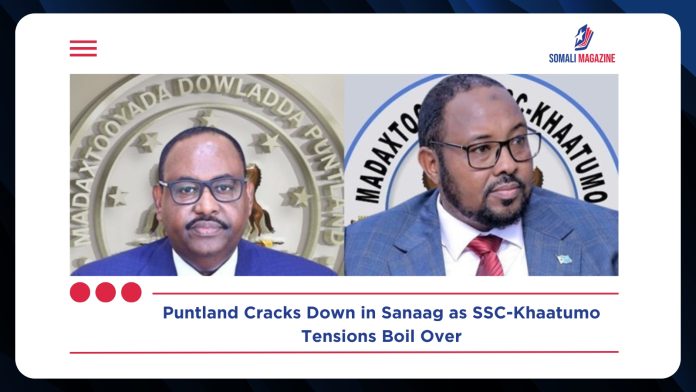Facebook Twitter (X) Instagram Somali Magazine - People's Magazine
Puntland bans unauthorized meetings and vehicles in Sanaag amid tensions over SSC-Khaatumo, escalating a political standoff that threatens to destabilize northern Somalia. The directive, issued Monday by Puntland’s regional administration, prohibits all gatherings not sanctioned by local authorities and bars vehicles bearing Somaliland or SSC-Khaatumo license plates from operating in the region.
The move comes as Puntland intensifies efforts to counter growing support for the newly recognized SSC-Khaatumo administration, which was officially endorsed by Somalia’s federal government earlier this year. In a statement, Puntland officials said the restrictions are aimed at “restoring order and stability” in Sanaag, a region long contested by multiple administrations and clans.
Security forces, including the elite Darwish and Puntland Maritime Police Force (PMPF), have been deployed to key areas in Sanaag to enforce the ban and disrupt political activities linked to SSC-Khaatumo supporters. The crackdown follows reports that local politicians were organizing a conference to endorse SSC-Khaatumo’s leadership summit in Las Anod and advocate for Sanaag’s incorporation into the new federal member state.
The ban extends to private venues such as hotels and community halls, with authorities warning that violators will face legal consequences. Vehicles without Puntland-issued license plates—particularly those affiliated with Somaliland or SSC-Khaatumo—are now considered a threat to public security and subject to impoundment.

This latest development underscores the deepening rift between Puntland and the federal government in Mogadishu. Puntland has long claimed constitutional authority over the Sool, Sanaag, and Cayn (SSC) regions, and views the federal recognition of SSC-Khaatumo as a direct challenge to its territorial integrity.
Tensions flared further over the weekend when Puntland forces took control of Elbuh, a coastal village in Sanaag, and expelled political figures aligned with the federal government. Among those forced to leave was former Puntland parliament speaker Abdirashid Yusuf Jibril, who was reportedly planning a pro-SSC-Khaatumo meeting.
Puntland officials have accused federal ministers, including Commerce Minister Mahmoud Ahmed Adan (Geesood), of working to destabilize the region by supporting SSC-Khaatumo’s expansion. Geesood had planned a visit to Elbuh but canceled after Puntland troops moved in.
At the heart of the dispute is a federal plan to merge the Sool, Sanaag, and Buuhoodle regions into a single administration under SSC-Khaatumo. Proponents argue the move would reduce clan tensions and improve service delivery. Puntland, however, sees it as unconstitutional and a threat to regional stability.
The contested regions sit at a strategic crossroads between Somaliland, Puntland, and Ethiopia’s Somali region, making them a flashpoint for political rivalry and occasional armed conflict. The area is also vulnerable to al-Shabaab activity, adding a volatile security dimension to the political crisis.
While SSC-Khaatumo leaders defend their engagement with the federal government as a rightful assertion of autonomy, Puntland insists that any change to its territorial boundaries must be the result of inclusive consultation and consensus.
Observers warn that the escalating tensions could derail Somalia’s fragile federalism and reignite conflict in a region already grappling with insecurity and humanitarian challenges.

